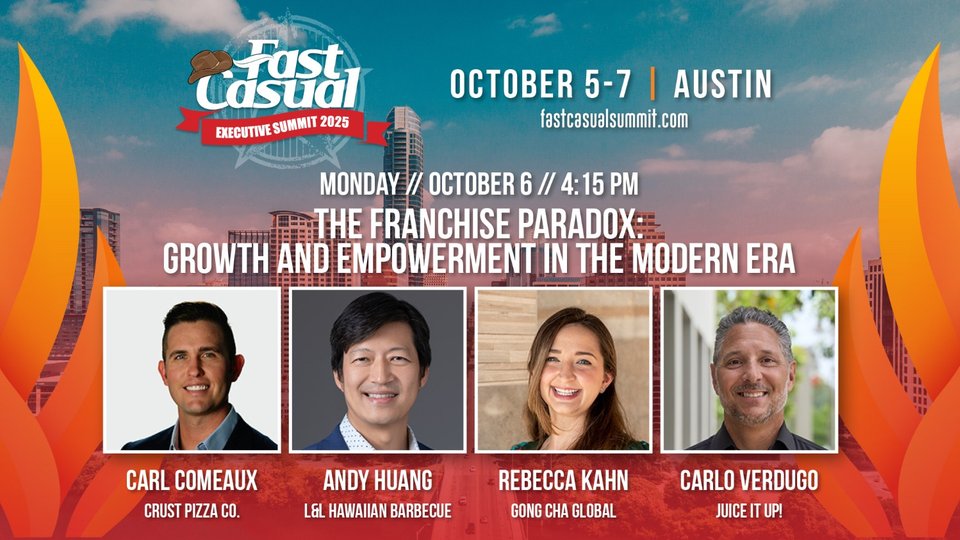Fast Casual Executive Summit
Gong cha, Crust Pizza leaders talk franchising in today's modern restaurant world
A session at the Fast Casual Executive Summit will look at franchising dos and don'ts as well as the latest trends and innovations in franchising.

August 27, 2025 by Mandy Wolf Detwiler — Editor, Networld Media Group
The landscape of franchising is undergoing a rapid and profound transformation, driven by a confluence of evolving consumer demands, groundbreaking technological advancements and a fundamental shift in the expectations of modern franchisees.
Gone are the days of a rigid, one-size-fits-all approach. Today, the traditional franchise model is being reshaped by innovative concepts like micro-franchising, which offers accessible, lower-cost opportunities and the seamless integration of technology-enabled franchising to streamline operations and provide data-driven insights. This evolution is not just about adapting to change; it's about pioneering new ways to build resilient, empowered and interconnected franchise networks that can thrive in a dynamic global market.
A session at the Fast Casual Executive Summit in Austin, Texas, Oct. 5-7 called "The Franchise Paradox: Growth and Empowerment in the Modern Era" will explore the latest trends and innovations in franchising. Register here for the summit.
Panel participants include:
- Carl Comeaux, CEO of Crust Pizza.
- Andy Huang, vice president and chief operating officer at L&L Hawaiian Barbecue.
- Rebecca Kahn senior director of master franchising operations for North America — Canada, USA, Mexico for Gong cha Global.
- Carlo Verdugo, VP of franchise operations and development for Juice It Up!
In an email Q&A, we asked the speakers about franchising dos and don'ts.
Q: In an era of growing franchisee independence and local market customization, how are leading brands fostering innovation at the unit level without sacrificing scalability or brand cohesion?
Comeaux: Innovation travels fastest when local ideas are tested, measured, and scaled across the system. A strong brand isn't built by stifling creativity — it's built by channeling it.
Q: What are the most effective strategies you've seen for building strong, collaborative franchisee communities — and how do these communities contribute to brand innovation and resilience?
Kahn: One of the most effective strategies I've seen is creating structured opportunities for open dialogue, knowledge-sharing, and co-creation between franchisees and the franchisor. I've seen tremendous success in building structured, yet flexible, franchisee councils where feedback isn't just heard — it's actioned. Whether it's through regular regional summits, franchisee advisory councils or collaborative pilot programs, giving franchisees a voice and a seat at the table fosters trust and mutual accountability.
When franchisees see that their ideas can shape policies, training, and even product launches, they shift from simply operating under a brand to actively contributing to its evolution. At Gong cha, some of our most valuable innovations, whether it's in-store technology, operational frameworks, or guest experience enhancements, have emerged from the field. Franchisees know their communities and customers deeply, and when we treat them as partners rather than recipients of top-down directives, we unlock an ecosystem of continuous improvement.
Strong franchisee communities also drive resilience. During challenging times — economic uncertainty, supply chain disruptions, or even local market shifts — franchisees who feel connected to each other and the brand are more likely to lean in, share solutions, and stay aligned with long-term brand goals. The network becomes a living, breathing support system that helps everyone weather the storm and emerge stronger. Franchisee communities are the frontline lens into what's working, what's shifting, and where innovation is needed. When these communities are strong, brands become more agile. They're able to anticipate and respond to challenges faster, and often with more creativity, because the solutions are co-developed by the very people who live the brand every day.
Q: What do you see brands doing wrong when it comes to franchising and how can they correct that?
Comeaux: Franchising fails when growth outruns economics — unit profitability must come first. A one-size-fits-all playbook works for t-shirts, not for markets.
Selecting franchisees is like selecting business partners—you can't afford the wrong fit.
Training is not a moment — it's a movement that drives long-term performance.
Q: What's one innovation or shift in franchising that you're most excited about right now — and why?
Kahn: I'm especially excited about the integration of smart technology into store operations — not just as a way to scale efficiency, but as a powerful tool to strengthen human connection. In an industry where guest experience is everything, tech like self-service kiosks, AI-driven analytics and mobile feedback platforms allow us to streamline operations, tailor service and engage guests more meaningfully.
There's been a real shift in mindset: from seeing technology as a transactional tool to embracing it as an engagement platform. At Gong cha, we're using digital kiosks, loyalty apps and in-store automation not only to improve speed and accuracy but to better understand our guests and personalize their experience in ways that are scalable across hundreds of locations.
For example, our field teams now have real-time visibility into store performance, allowing them to focus support where it's needed most. We're also exploring how digital loyalty platforms and storytelling can empower franchisees to build deeper local connections while still delivering on the promise of a global brand. In franchising, this is a game-changer. Historically, one of the biggest challenges has been scaling authentic, meaningful guest interactions across a wide network of owners. Now, technology allows us to do that — consistently and intelligently — so franchisees can compete not just on product, but also on experience.
And more importantly, it gives us an opportunity to connect innovation with values. We're exploring ways to align promotions with social causes or cultural moments that matter to our guests, using technology to build emotional loyalty, not just transactional frequency. That's where the future of franchising is headed: toward brands that are not only operationally excellent but meaningfully connected to the people they serve.
The Fast Casual Executive Summit is hosted by Networld Media Group. Click here to register for the Summit.
About Mandy Wolf Detwiler
Mandy Wolf Detwiler is the managing editor at Networld Media Group and the site editor for PizzaMarketplace.com and QSRweb.com. She has more than 20 years’ experience covering food, people and places.
An award-winning print journalist, Mandy brings more than 20 years’ experience to Networld Media Group. She has spent nearly two decades covering the pizza industry, from independent pizzerias to multi-unit chains and every size business in between. Mandy has been featured on the Food Network and has won numerous awards for her coverage of the restaurant industry. She has an insatiable appetite for learning, and can tell you where to find the best slices in the country after spending 15 years traveling and eating pizza for a living.







